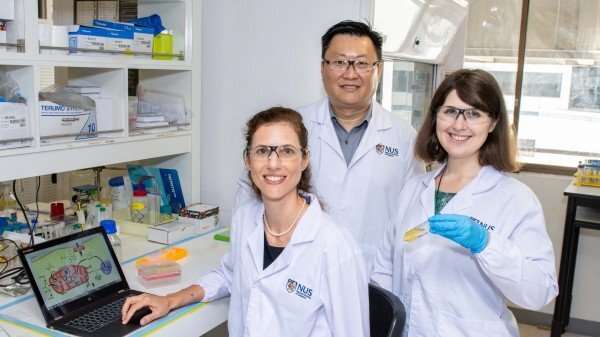Source: Thailand Medical News Sep 18, 2019 6 years, 5 months, 1 day, 3 hours, 14 minutes ago
Researchers from the National University of Singapore (NUS) has developed a new anti-cancer drug that has less toxic side effects to the kidneys unlike conventional cancer drugs used I chemotherapy or other cancer treatment protocols. The newly developed drug works like a ‘targeted arrow’ that is delivered directly to the mitochondria, the powerhouses of cancer cells. Once the drug reaches the tumor, two active molecules ie an anti-cancer drug and a sensitizer are released simultaneously and they destroy the mitochondria, leading to the death of cancer cells. Such a targeted protocol decreases the drug's interactions with other tissues, minimizing side effects especially renal and liver issues. It also lowers the risk of patients developing resistance to anti-cancer drugs like cisplatin.
New anti-cancer drug developed by Assoc Prof Giorgia Pastorin,
Assoc Prof Ang Wee Han (Credit: NUS)
Cisplatin which has been as a main cancer drug in chemotherapy and the newer generation of platinum-based anti-cancer drugs all have toxic side effects, such as causing severe kidney dysfunction in patients, which may require some patients to undergo dialysis treatment. While they also affect the liver and also cause a host of other complications in the long term.
Associate Professor Ang Wee Han from the Department of Chemistry at the NUS Faculty of Science
commented to Thailand Medical News, "When formulating, designing and evaluating new cancer treatments, researchers often use cisplatin as a gold standard to compare new pharmaceuticals. Cisplatin is known to kill cancer cells by damaging DNA. But cancer cells are intelligent, and they have evolved ways to repair this damage and become resistant to the drug treatment. Hence, what is needed are good and safer alternatives that can address drug resistance and the associated side effects."
Together with Associate Professor Giorgia Pastorin from the Department of Pharmacy at the NUS Faculty of Science, the team looked into developing an anti-cancer drug with better treatment outcomes to serve as an alternative to cisplatin. The research was conducted in collaboration with Professor Dan Gibson from The Hebrew University of Jerusalem in Israel.
Knowing that the mitochondria have less efficient repair mechanisms in their DNA, the research team came up with a novel drug that can be delivered directly to the mitochondria in cancer cells. This was managed by adding a mitochondria-targeting ligand to the original cisplatin scaffold. This additional ligand has a strong positive charge that displays high affinity towards the complementary negative charge of the mitochondrial membrane.
The medical researchers examined how the new drug was released into the blood,and came up with a method to encapsulate their novel drug formulation in miniaturized drug carriers known as liposomal nanovesicles. As tumors gro
w very rapidly, their blood vessels do not have time to develop properly and they are leaky. Such an environment enables the permeation of the drug carriers from blood vessels to the tumor ecosystem, and be retained within the tumor to carry out the attack on the cancer cells.
Experiments by the researchers showed that the new drug, when delivered in a colon cancer model, shrank the tumor until it became impalpable. No sign of kidney inflammation was detected, unlike the use of conventional cisplatin. These results indicate that the new drug is a viable alternative to Cisplatin.
While the results show great potential, the team want to further challenge themselves to improve the drug so that we can achieve complete tumor remission and tackle drug resistance. Accomplishing such a feat will open doors to improving cancer treatment and survival rates.
To improve the efficacy of the new drug, the research team is looking into adjusting the doses and frequencies of the treatment. They are also studying combinations of different anti-cancer drugs,and examining ways to packaging them into suitable drug delivery systems to increase efficacy, decrease side effects and tackle drug resistance among cancer patients.
While conducting more research, the team is also planning to get both local regulatory permissions and US FDA approvals for more clinical trials so as to get the product available commercially by at least 2021.
Reference:
Maria V. Babak et al. Dual-Targeting Dual-Action Platinum(IV) Platform for Enhanced Anticancer Activity and Reduced Nephrotoxicity, Angewandte Chemie International Edition (2019). DOI: 10.1002/anie.201903112
